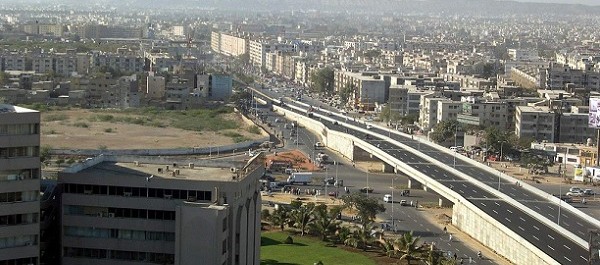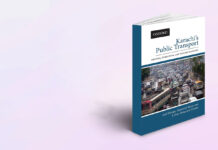
KARACHI: With security threats on the wane, Pakistan is turning its attention to accelerating economic growth by unsnarling traffic in its big cities.
In Karachi, the country’s largest commercial hub, two Metrobus express bus routes running in dedicated lanes will begin operating, possibly by the middle of this year. Transport authorities are also considering putting the disused Karachi Circular Railway back into service. If the changes are successful, Karachi could become a model for other Asian cities struggling with traffic problems, such as New Delhi and Jakarta.
Karachi, the capital of Pakistan’s southern Sindh Province, is one of the fastest growing cities in the world. The government puts the population at about 16 million, but many experts believe the continual inflow of migrants from the countryside has pushed the true figure closer to 20 million.
The Pakistan Rangers, a powerful paramilitary force, has worked with the army to quell terrorist attacks and incidents of organized crime such as kidnapping. Improved stability has allowed local authorities to focus on making Karachi a more efficient city.
Nasir Hussain Shah, Sindh’s provincial-level minister for labor, transport and information, said the two Karachi Metrobus services will be in operation by midyear. They are expected to ease the city’s severe congestion. Similar services are already operating in Islamabad, the capital, Lahore in the northeast and elsewhere.
According to Shah, a veteran Pakistan People’s Party lawmaker, the two routes, the 21.1km Green Line running north to south, and the Orange Line, a 3.9km feeder route, “are very feasible because Karachi has a huge ridership. We are also going to break ground on the Blue and Brown lines in 2018.”
The provincial government previously considered building subway lines, but the project was dropped due to the cost. Express buses were chosen for Karachi because aboveground transport was thought to be both efficient and relatively inexpensive.
Another potential improvement to the transport network is refurbishing the 140km Karachi Circular Railway, which has been out of service for nearly 20 years. The operator went bankrupt in 1999. The Japan International Cooperation Agency conducted a preliminary study for the project in 2013.
In response to critics who wonder where the money for the projects will come from, Shah says, “Tax revenue is going better because we had an amendment to the constitution, and so many powers [were transferred] from the federal government.” Others are looking to China to help pay for Pakistan’s infrastructure needs.
Karachi’s notorious traffic jams are a major hindrance to economic growth. The streets ring with the constant blowing of horns. Vehicles of every shape and size, from buses and motorcycles to donkey carts, crawl along.
Other bottlenecks are bureaucratic. Karachi’s “triple-layer governance” slows the building of infrastructure. The national government is run by the Pakistan Muslim League-Nawaz, while the opposition PPP controls Sindh. And in Karachi itself, the Muttahida Qaumi Movement, the fourth-largest party in lower house of the National Assembly, calls the shots.
But things are looking up despite these obstacles. Karachi generates 60% to 70% of Pakistan’s total tax revenue, which gives it a lot of clout. many business people and local politicians blame poor public investment for holding the city back. “Powers in water supply, sewage and waste management must be transferred to the local government,” argues MQM leader and former Karachi Mayor Farooq Sattar.
To ensure cooperation among federal, provincial and local authorities, former Prime Minister Nawaz Sharif appointed Mohammad Zubair, a powerful politician and former executive of IBM, governor of Sindh province last year.
His task is to rein in both the provincial and Karachi local governments and keep everyone on the same page. Petitioners seeking Zubair’s help gather at his residence almost daily.
“We have initiated the [Karachi Circular Railway] project. It is going to the China-Pakistan Economic Corridor to get funding [from Chinese companies],” Zubair said, adding that the project has been approved by the central government’s planning commission and conditionally approved by China. “We are waiting for feasibility report,” he said.
Karachi has the ambition to improve its transport network as a first step to reaching its full economic potential. The challenge will be in the execution.
Courtesy: Nikkei Asian Review






